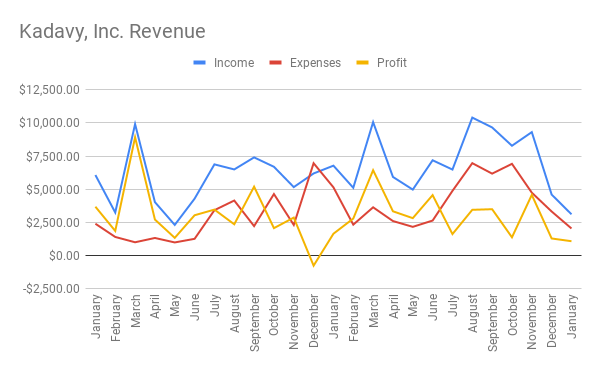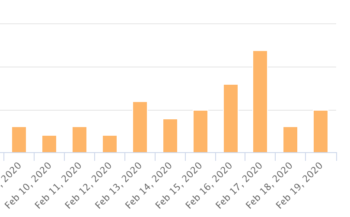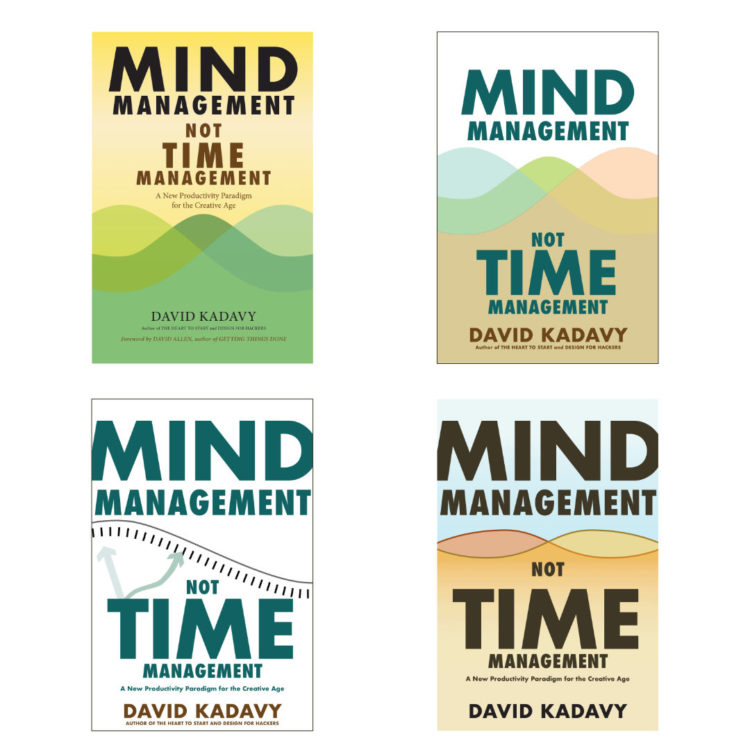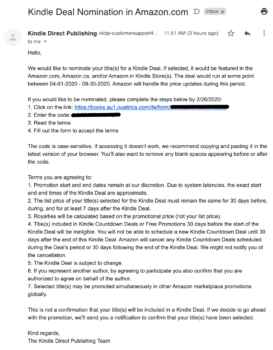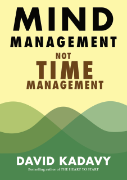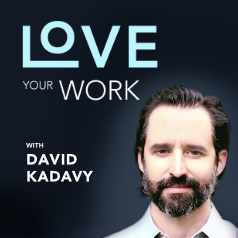Subscribe to blog updates via email »
January 2020 Income Report
An audio version of this income report is available to Patreon backers of certain levels »
January’s revenues were $3,104, down from Decempber’s $4,594. Profits were $1,072, down from December’s $1,278.
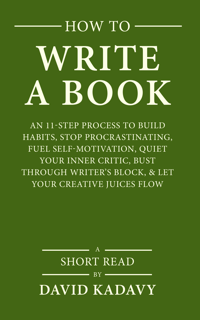
WANT TO WRITE A BOOK?
Download your FREE copy of How to Write a Book »
(for a limited time)
January was the lowest-profit month in more than a year. In December 2019, I lost $773.45. Other than that, this month is the second-least-profitable month in the history of these reports.
Big up-front bill cut into profits
A big source of this lower profit was an up-front yearly expense for one of my most expensive services. In January, I paid WP Engine $1,150 for an entire year of WordPress Hosting.
As I’ve mentioned before, I try to pay for an entire year of service up-front for as many services as possible at the end of the year, not at the beginning. Years ago, I manually emailed WP Engine to get them to bill me toward the end of the year. But several years ago, they claim that they can’t do that, and they can’t change the billing date.
So, it’s less than ideal to have such a large expense at the beginning of a year. It really cuts into my profit numbers for January, and I’m also going to be reporting $1,150 more profit for 2019, for which I’ll soon be paying taxes – yet as of the beginning of the year, I don’t even have that $1,150. This is why myself and many business owners try to pay for services at the end of the year.
Working on better tweets, & why it matters
Even without so much expense being loaded into one month, January was an unexceptional and under-average-profit month. I wasn’t pushing any course sales in January. In fact, most of January, I was focused on writing better tweets – as described in the December income report.
It feels ridiculous to even type that, but it was a valuable experiment. I did sharply increase my engagement on my tweets, though that increase has dropped to only a modest increase.
Overall, I nearly stopped using Twitter altogether. As I first began working harder on tweets, I had a ton of ideas. Lately, the stream of those ideas has slowed down.
But, I can feel my messaging sharpening ever so slightly. In a perfect world, I would have a very clear target audience and a very clear benefit to offer that audience. Every thought I had would fit within that messaging, and every message I created in one channel would flow effortlessly into another channel.
I’m nowhere near that level of crispness, but I do feel I’m getting closer to it. Tweets that performed well in January, I’m now expanding into Love Mondays emails. I’m also integrating some of that messing into the book that I’m working on, Mind Management, Not Time Management.
In this way, I’m able to test out different ways of explaining different concepts. If they do well on Twitter, chances are, they’ll make compelling passages in the book – perhaps passages that will end up being popular highlights. These passages will also make good “sound bites” for when I talk about the book while a guest on other podcasts.
I spent so much of the past four years trying to figure out how to write a lot of words. Now I’m trying to figure out how to make a small amount of words as compelling as possible. It’s a completely different challenge, and it’s the reason I have for putting so much effort into improving at Twitter during January.
Ideally, popular tweets would become Love Mondays emails, which would expand into podcast episodes, which would then expand into books. That takes a lot of discipline, or an extremely-well-defined worldview. I’m always working on both.
Media fasting
In the beginning of the year, I’ve been on somewhat of a media fast. I’ve hardly used social media, listened to podcasts, or even read books.
At times, it has felt like I was out of ideas. But a media fast feels like digging through several decades worth of junk in your dead grandmother’s attic. Just when you think you’ve gotten rid of most of the junk, there’s more of it. And sometimes you come across something interesting or even valuable.
You couldn’t get to that interesting stuff without digging through all of that crap, and you couldn’t dig through all of that crap in the attic of your mind without a media fast.
Why doing less is hard
Doing a media fast requires a lot of doing less. I’m used to listening to podcasts while I do things around the house, such as cook. I’m used to checking social media whenever I feel bored. I’m used to compulsively reading books for at least an hour a day. I haven’t been doing any of that.
Doing less is hard, because when you force yourself to do less, you get the space to slow down and ask deeper questions about the thoughts in your head. Since you’re doing less, you have to choose more wisely what actions you do take. So, you start to ask questions about why you’re doing what you’re doing, or whether it’s necessary.
What’s the purpose of reading this book? Why listen to this podcast? What’s the result I expect from writing this article?
I know that I sometimes hide in my compulsion to always be “working.” The reason it’s hiding is because when you’re doing a ton of different things, it makes it hard to connect actions with results. It also makes it easy to fall for hindsight bias: You knew this thing or the other thing wouldn’t work or would work. Did you write down your prediction? No, you were too busy for that.
So, doing less forces you to be more careful with what you do do. Doing less makes you ask yourself tough questions.
Better information digestion
One benefit I’m noticing from media fasting and doing less is better information digestion. When you’re doing less, and you’re not consuming media, all that’s left for you to do is think.
Lots of that thinking is thinking you wouldn’t otherwise be doing about information you’ve already encountered, or ideas that you’re still processing.
The more I learn about how memories are formed, the more I realize that forming memories isn’t a whole lot different from having ideas.
To form a memory, it helps to connect it to some existing knowledge or experience you have. The more brain power leftover to make those connections, the more easily you’ll form memories.
Memory consolidation is at the crux of having ideas. Good ideas are connections of disparate elements. You need to learn things in order to connect them into ideas.
But also, the more brain power you have leftover to digest connections you’ve tested out while trying to have ideas, the more crisp those ideas will be.
So, I think this better information digestion is helping create more crisp relationships between the various pieces of creative work I do.
If I have more mental space leftover to think about a tweet, that makes it easier to expand it into a Love Mondays newsletter, and to eventually expand the concept into a podcast episode or a book.
How doing nothing prevents “idea leakage”
Ultimately, I think having more space to think over ideas and to be more deliberate about the ideas I follow and the media I consume prevents what I call “idea leakage.”
We scatterbrained people with lots of ideas have a lot of idea leakage. One idea isn’t connected to another idea. In some ways, each new idea becomes an escape route from working on the hard parts of the previous idea. You know, “shiny object syndrome.”
But when you get uncomfortable while pushing an idea forward, you don’t have to escape into another idea, or consume more media. You can simply do nothing instead.
When you do nothing, your mind is naturally active doing something. It’s called the “default mode network.” There’s barely more electrical activity in your brain when you’re actively thinking than when you’re trying to do nothing.
When you do nothing, your brain is digesting the thoughts and information it has recently had. Additionally, it’s regaining its energy.
After enough time doing nothing, not only is the next action you can take on your idea more clear, but you also have enough mental energy available to do something about it.
I suspect that with enough practice, it starts to become second nature: You stop escaping into other ideas (“shiny object syndrome”), and you start thinking in a more focused manner about the ideas you do have.
So, I’ll try to keep up my media fast, so I can better digest information, and stop leaking ideas.
The downside of a media fast
The main downside of a media fast that I’ve noticed is that when I don’t read much, I don’t seem to write as well. I need to find the right amount of reading – and the right kind of reading – to still feed my writing ability, without the reading itself becoming a distraction.
Solid book profits
The poor profit showing for January has nothing to do with book sales. I brought in $920 in self-published book royalties.
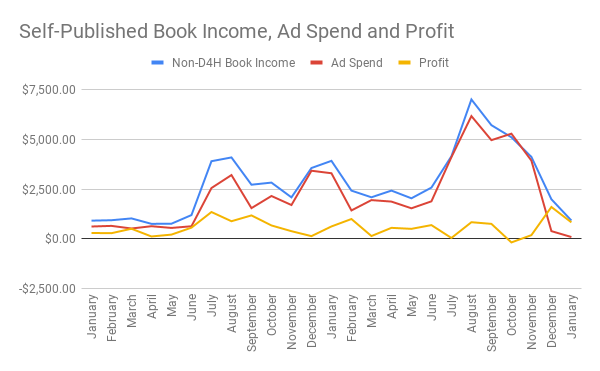
By reducing advertising costs, profits on book sales have risen – but it doesn’t appear they will sustain this way.
Historically, that’s very little revenue, but I’m still running hardly any ads at all. I spent a total of $91 on ads, for a self-published books profit of $829. That’s well above the 2019 average of $436.52.
Here’s a scatter plot of my book sale profits (vertical axis) by ad spend. Not seeing super clear patterns here, but it looks like around $2,000 a month in ad spend might be a good number for me.
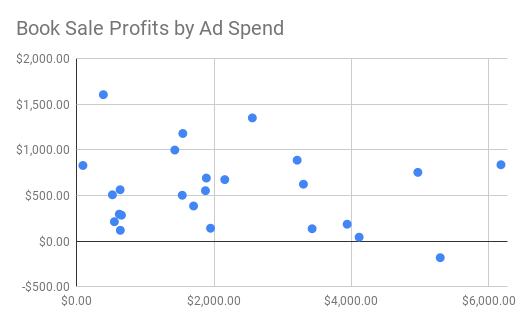
Book sale profits (vertical) by ad spend.
First “local” pricing promotion
With almost no ads to drive sales, organic sales have steadily been declining.
Valentine’s Day weekend was my first scheduled “local” pricing promotion for HTS. In a “local” pricing promotion, I drop the price of a book, and only promote the sale to new emails on my list.
I dropped HTS from $9.99 to $2.99, and promoted it to every new email since the “global” Black Friday promotion. The sales bump was very modest – from an average of two or three sales a day to a spike of twelve in one day.
Probably because it was promoted to fewer than 200 email list contacts.
I clearly can’t sustain solid book sales with this method alone – and sending a pricing promotion to my entire list every 90 days is out of the question!
Slowly starting more Amazon Ads
Since pricing promotions alone won’t keep my sales afloat, I am trying Amazon ads again.
Throughout January, I ran some ads on the “Performance” keywords I built up from many months of harvesting keywords that led to sales, using the Prestozon method.
The results were underwhelming.
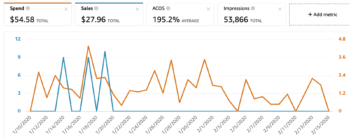
I thought maybe I could drive sales to WAB, and that that might drive more organic sales to HTS. Kind of like the “read through” that I’m sick of hearing fiction authors talk about.
So, far, no reason to believe that’s working.
I just started my first Lockscreen ad for HTS since I turned off ads on November 25th. Too early to tell how that’s going.
I have a ton of data on Lockscreen ad performance, from when I was spending upwards of $5k a month on Amazon ads. Assuming Amazon’s reporting is reliable at all, maybe I can use this data to be more discerning with my bids, ad creatives, and the categories I choose to advertise to.
Loading the sales slingshot with Amazon Ads?
One hypothesis I have is that much of the jump in sales I had before officially announcing the Black Friday promotion may have been due to a backlog of people who had seen HTS through Lockscreen ads.
I recently began subscribing to Amazon’s emails, and it was pretty eye-opening. They send you book recommendations based upon your browsing and buying behavior.
I suspect that as soon as I dropped the price of HTS, that triggered Amazon to send an email to people who had shown interest in the book.
Maybe they had visited the book’s sales page. Maybe they had downloaded a Kindle sample. Whatever the case, there would have been a big backlog in late November – after several months of spending thousands of dollars on ads. That backlog would have been much bigger than there would have been over Valentine’s Day weekend – after two and a half months of no ads at all.
I’ll have to watch closely to see what happens when I drop the price for my next “local” promotion – provided it’s a book I’ve run ads for. Well, I’ve run some ads for How to Write a Book – maybe I should run more, for testing purposes?
Self Publishing coaching
The success of my seminal self publishing blog post has been undeniable. I’ve had multiple people send me money via PayPal just to thank me for this blog post.
I’ve been experimenting with how best to capitalize on the success of this article. The Medium version of this article currently gets more than 6,000 visits per month.
At the end of the article, I had a call to action to call me on Clarity. Then, I tried putting a call to action to sign up for a short email/video course on self publishing, thinking that would build the relationship, later convincing people to book a call with me.
That didn’t work very well, so I’m back to the call to action to book a call with me on Clarity.
I optimized my Clarity profile several months ago – something pretty easy to do that it appears few people on the platform bother with.
All of the calls I’ve had booked with me over the past several months have been about self publishing. So, I recently refined my profile even further, optimizing it hard for “self publishing,” even calling myself a “self publishing coach.”
In the process, I deleted my expertise listing on Podcasting. Nobody bothered to call me about podcasting. Then again, that makes me realize that I never prompted anyone to call me about podcasting at the end of any of my more popular podcasting posts. Maybe I should reinstate that listing, and try again.
Anyway, right now, I’m one of the top results when you search for “self publishing.”
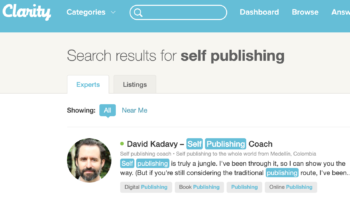
My Clarity profile now ranks #1 for the “self publishing” keyphrase.
If you need help navigating the self publishing jungle, book a call!
Mind Management, Not Time Management feedback
I formed a group of beta readers a couple of months ago, and I have now sent them two of the planned seven chapters for my upcoming book, Mind Management, Not Time Management.
So, I’m beginning to get some feedback on the version of the draft that I started back in July.
I’ve also developed some cover concepts. Which one do you prefer?
Kickstarter?
I keep chipping away at some messaging for a Kickstarter for MMTM.
I’m also working on the first chapter of the book. The first chapter of a book is the hardest chapter, because that’s where you have to really drive home the concept of the book, why it matters to the reader, why now is the time for this book, and why you are the only person who could have written it.
Of course, all of this information is exactly the stuff you want to communicate in a Kickstarter video, so it’s slow going.
I really have trouble getting excited about planning the video and doing the production. Maybe that’s because it’s hard, because I don’t have much experience in it, and because it will require me to collaborate with a video person – and collaboration isn’t my forte.
I’m tempted to simply talk to a camera, but the bar has been raised on the quality of video production on Kickstarter. I can almost certainly get a lot more support if I make a high-quality video that demonstrates to both loyal followers and the rest of the world that I’m serious about this book.
The Heart to Start nominated for a Kindle Deal
Just as I was getting to the end of this report, I got an email from Amazon telling me that The Heart to Start is eligible for a Kindle Deal.
Some of the things this email says:
- The deal would happen between April 1 and September 30th, at Amazon’s discretion.
- The price of my book would have to remain the same for 30 days before, during, and 7 days after the deal.
- This does not mean that my book will be selected, merely that it may be selected.
I followed the instructions to accept the terms and nominate the book for a Kindle Deal.
My main consideration in light of this is that this puts a wrench in my plans for pricing promotions I had planned this year. If my book has to stay the same price for 30 days before an (unknown) promotion date, and if that promotion can happen within a six month window, I’ll have to have no pricing promotions during that period – if I’d like to ensure eligibility.
Additionally, I recently experimented with dropping the price of HTS in territories outside of the U.S., including Canada and India – a couple of the eligible markets. The reasoning being that since the book doesn’t have as much popularity and reviews in these other territories, it might drive book sales.
I haven’t seen a big uptick from that experiment, so I guess it’s time to re-price the book to be similar to U.S. prices in those territories. This seemingly would increase my chances for my book to be chosen for a Deal in these other markets.
Since the pricing needs to remained unchanged for 30 days, and since the window of eligibility for Kindle Deals doesn’t begin until April 1st, that gives me until March 1st to change those prices.
Looking at a thread on the 20 Books to 50k Facebook Group, people’s experiences with these deals vary from hardly impact at all, to major impact. It seems to matter for which market your book is chosen, and the type of deal.
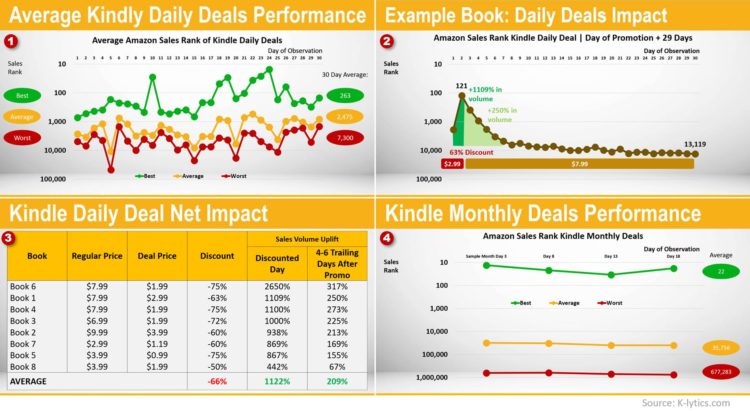
Graph from K-Lytics showing performance of Kindle Deals.
The email doesn’t indicate the type of deal, but it appears there are “Daily Deals,” and “Monthly Deals,” with the Daily Deals being reported as more impactful. I imagine this email applies to both types of these deals, and that it’s up to Amazon’s discretion which deal they choose your book for, and in which market.
Should I keep trying for a BookBub featured deal?
The fact that price changes preclude my book from being selected from a deal for 30 days makes me wonder, should I keep trying for a BookBub featured deal?
It may be a moot point: HTS has been rejected twelve times in a row for a U.S. featured deal.
Keep in mind, such a deal would cost about $1,000 to run. Which makes me wonder about Amazon’s long-term strategy here: Will they eventually charge to include books in their Kindle Deals? Hmmmm.
Moving
I said in last month’s report that I simply hope for a year without any major catastrophes. No catastrophes so far, but certainly a stressful experience: My landlord here in Colombia told me I have to leave my apartment by the end of February.
I had already been dabbling in an apartment search, but this suddenly laid a deadline on that search.
Searching for a home is never fun, but it’s especially difficult in a foreign country. Since most of my assets and income come from the U.S., that makes it difficult for landlords to be assured that if I didn’t pay my rent, they would have some recourse.
Many landlords ask for a co-signer, with some very high income requirements for Colombia. I don’t have one! Others ask that you put as much as ten month’s rent in a bank account that they have access to, in case of a problem.
I even offered one landlord to pay a whole year up-front. I said I’d do it right that moment from my phone. He refused. He needed a co-signer who owned property or had a job.
I was approved for one apartment, only to find out that someone got it, through another agency, before I had a chance to sign the papers.
To complicate matters further, if you want a good apartment in Colombia, you can’t rely on the internet. What sites that do list properties are littered with properties that are no longer available – the agencies use them as lead generation.
So, the best way to find an apartment in Medellín – and anyone who has lived here will tell you this – is to find the neighborhood you want to live in, and literally walk around, looking for apartments. I’ve spent most afternoons in February walking around, talking to the doormen in every apartment building. It’s good exercise, but it’s a productivity killer!
Right now, I’m close to signing papers directly with an apartment owner – which is supposedly more simple than working with an agency. But again, his insurance company is asking for co-signers. I have my fingers crossed, hoping it will work out.
Goodbye minimalism?
As part of my initiative to become a good writer, and to test out the concepts I’ll be sharing in my next book, I’ve been living in a furnished apartment for the past four years.
It’s been wonderful to not have to think about any of the stuff around me.
But it’s nearly impossible to find a furnished apartment that has a home office. It’s just not something people look for commonly in Colombia. As you can imagine, furnished apartments are also much more expensive than unfurnished apartments.
So, the apartments I’ve been looking at are unfurnished. I have no furniture, aside from a small desk and a chair, so I may be on the cusp of acquiring stuff again.
I have mixed feelings about it. On the one hand, it will be nice to have control over my environment. On the other hand, I fear what trying to find stuff, and having stuff, will do to my ability to focus.
My monkey mind is protesting to me, saying, “Hey, asshole, we worked hard in the living room of this tiny apartment for the past four years. You said we ‘graduated’. Give us some decent space to work in, or I’m not doing shit.”
In other words, the monkey in my mind is saying give me a banana, or I’m going to start slinging shit all over the place.
It will be an interesting experience to let stuff back into my life. I like to think that I’ve trained my mind well enough now that I can start living like a normal person again.
Income
Book Sales
Digital Products
| D4H Video | $149 |
| Summer of Design | $6 |
| Total Digital Products | $155 |
Affiliates / Advertising
| Active Campaign | $1,220 |
| Amazon | $70 |
| ConvertKit | $62 |
| Hostgator | $200 |
| SendOwl | $5 |
| Total Affiliates | $1,556 |
Love Your Work Podcast
| Patreon | $195 |
| PayPal Donations | $10 |
| Sponsors | $210 |
| Total LYW Podcast | $415 |
Services
| Medium | $11 |
| Clarity | $46 |
| Total Services | $57 |
| GROSS INCOME | $3,104 |
Expenses
General
| Accounting | $185 |
| Outside Contractors | $221 |
| Podcast Editing / Publishing | $254 |
| Misc. Software | $8 |
| Total General | $667 |
Advertising
| Amazon | $42 |
| BookBub | $32 |
| Comped books | $10 |
| $8 | |
| Total Advertising | $91 |
Hosting
| Bookfunnel | $15 |
| Evernote | $35 |
| Genius Link | $10 |
| Libsyn | $20 |
| SendOwl | $24 |
| Teachable | $20 |
| WP Engine | $1,150 |
| Total Hosting | $1,273 |
| TOTAL EXPENSES | $2,032 |
| NET PROFIT | $1,072 |

